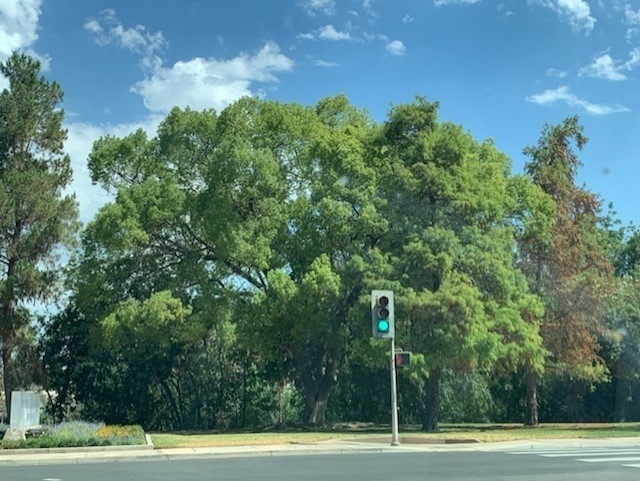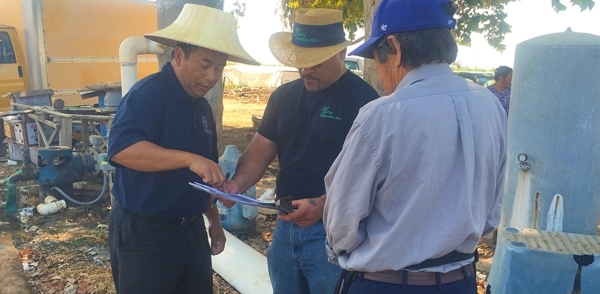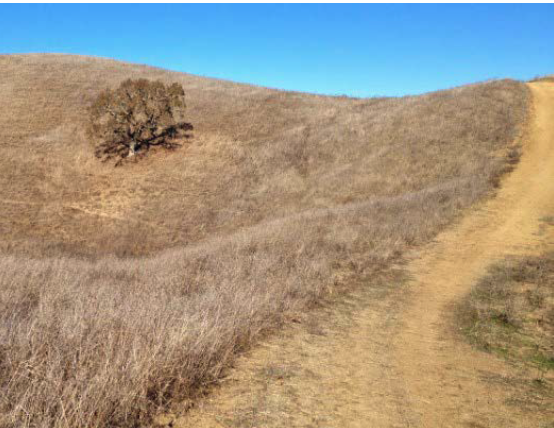Posts Tagged: lived name
Lawn-pocalypse! Surviving Drought
Ah, summer! The season of sunburns, pool parties, and… lawn droughts. If your once lush, green carpet now looks like a crunchy brown doormat, you're not alone. Let's dive into why your yard is staging a dramatic death scene and what you can do to...

Bermuda grass and weeds overtaking drought stressed turf grass.
Gender recognition and lived name update
UC ANR continues to make significant steps towards building a more equitable and inclusive work environment, including developing further support and training for the Gender Recognition and Lived Name policy. This work is consistent with our UC ANR Principles of Community, which ensures a safe and inclusive work environment and encourages us to provide tools and training to ensure all employees have the same resources available to them. Please take a look at the most recent updates below and reach out to let us know if you are interested in learning more.
Forms and administration: Please consider the new policies and conventions when creating new online forms that capture name and/or gender.
Updating Name in UCPath and Microsoft Outlook:
- UC ANR uses the UC Davis instance of Microsoft Office 365. Newly added to Microsoft Outlook, your name display will automatically reflect based on your Name in UCPath.
- If your Name had not been updated in UCPath, you may have already noticed changes to your display name
- UCPath provides you an option to provide a self-chosen name. The?Name?field in UCPath is distinct from Legal Name used to identify the employee's self-chosen name.
- Employee can enter this information by following the navigation: Employee Actions >Personal Information Summary.
- More details about UCPath name change can be found in: Lived Name on UCPath - YouTube or UCPath Launches Lived Name Functionality | UCPath (universityofcalifornia.edu).
- For additional instructions and screenshots, please take a look here: Update My Name.
- After making your changes in UCPath, make sure to click the “Submit” button to get to the Save confirmation screen. Once on the Save Confirmation screen, click “Ok” and then you should receive an email confirmation confirming changes. UCPath will then confirm the name change.
- Updates will appear in 24 to 72 hours (about 3 days) in UCD Microsoft 365. If it has been longer than 72 hours, please verify the updates are reflected in UCPath as appropriate. Log out and back into systems to also assist in updating the new data. If this persists, please contact UCD IT Express.
- Some platforms may not reflect lived names immediately after a change is made. For example, the Microsoft Teams client may cache some data, like display names, for up to 28 days.
Contact us for more information at GRLN@ucanr.edu
Bethanie Brown
Interim Executive Director of Human Resources
Gender Recognition and Lived Name Policy
Across the University of California system, significant steps are being taken to support a more equitable and inclusive work environment. In 2020, President Michael V. Drake, M.D., announced the Gender Recognition and Lived Name Policy (GRLN) to ensure that all individuals are identified by their accurate gender identity and lived or preferred name on university-issued documents and in UC's information systems.
Using correct names and pronouns shows respect and acceptance and honors individual agency. There are many of us who are benefiting from GRLN, including trans and nonbinary people, people whose gender identity is different than indicated on official documents, survivors of abuse or trafficking, people whose lived or preferred name is a variation of their legal name (e.g., international students, faculty and staff who have adopted anglicized names), or married people who had a legal name change, but prefer to use the name under which they have published academic works.
UC ANR, UCPath and UC Systemwide have partnered to offer the following process and system improvements, effective June 20, 2023:
- UCPath online has built new options to support the Gender Recognition and Lived Name policy. These changes allow for UC ANR employees to populate changes to the Name field, which flow into our UC ANR Directory and Portal.
- The Name field is defined as a self-chosen or personal and/or preferred professional name used instead of a legal name.
- Starting on June 20, employees can change their name in UCPath using the employee self-service (no longer directly in the UC ANR portal). Watch this video for what to expect in UCPath: What to Expect for Managers and Employees
- Changes made in UCPath will be reflected in the UC ANR Directory and Portal. The legal name change process remains unaffected, for instructions go to: Update My Legal Name.
What Do You Need to Do?
- Keep your name: No change required. What is populated as your UCPath preferred name will become your Name. If there is no preferred name in UCPath, the legal name will populate the Name field.
- Update your name and/or identity: Go to UCPath employee self-service to make updates when:
- You prefer a shortened or alternate version of your legal name (ex. Elizabeth = Lizzie; Robert = Rob/Bob; Sung Kwon = Sung).
- You want to change name and gender as given/birth name/gender does not reflect your gender identity.
- Your married legal name does not match preferred name under which you are published or known professionally.
Climate-Change Resources
University of California UC ANR Green Blog (Climate Change and Other Topics) https://ucanr.edu/blogs/Green/index.cfm?tagname=climate%20change (full index)
Examples:
- Save Trees First: Tips to Keep Them Alive Under Drought https://ucanr.edu/b/~CdD
- Landscaping with Fire Exposure in Mind: https://ucanr.edu/b/~G4D
- Cities in California Inland Areas Must Make Street Tree Changes to adapt to Future Climate https://ucanr.edu/b/~oF7
Drought, Climate Change and California Water Management Ted Grantham, UC Cooperative Extension specialist (23 minutes) https://youtu.be/dlimj75Wn9Q
Climate Variability and Change: Trends and Impacts on CA Agriculture Tapan Pathak, UC Cooperative Extension specialist (24 minutes) https://youtu.be/bIHI0yqqQJc
California Institute for Water Resources (links to blogs, talks, podcasts, water experts, etc.) https://ciwr.ucanr.edu/California_Drought_Expertise/
UC ANR Wildfire Resources (publications, videos, etc.) https://ucanr.edu/News/For_the_media/Press_kits/Wildfire/ (main website)
-UC ANR Fire Resources and Information https://ucanr.edu/sites/fire/ (main website)
-Preparing Home Landscaping https://ucanr.edu/sites/fire/Prepare/Landscaping/
UC ANR Free Publications https://anrcatalog.ucanr.edu/ (main website)
- Benefits of Plants to Humans and Urban Ecosystems: https://anrcatalog.ucanr.edu/pdf/8726.pdf
-Keeping Plants Alive Under Drought and Water Restrictions (English version) https://anrcatalog.ucanr.edu/pdf/8553.pdf
(Spanish version) https://anrcatalog.ucanr.edu/pdf/8628.pdf
- Use of Graywater in Urban Landscapes https://anrcatalog.ucanr.edu/pdf/8536.pdf
- Sustainable Landscaping in California https://anrcatalog.ucanr.edu/pdf/8504.pdf
Other (Non-UC) Climate Change Resources
Urban Forests and Climate Change. Urban forests play an important role in climate change mitigation and adaptation. Active stewardship of a community's forestry assets can strengthen local resilience to climate change while creating more sustainable and desirable places to live. https://www.fs.usda.gov/ccrc/topics/urban-forests
Examining the Viability of Planting Trees to Mitigate Climate Change (plausible at the forest level) https://climate.nasa.gov/news/2927/examining-the-viability-of-planting-trees-to-help-mitigate-climate-change/
Reports and other information resources coordinated under the auspices of the United Nations and produced through the collaboration of thousands of international scientists to provide a clear and up to date view of the current state of scientific knowledge relevant to climate change. United Nations Climate Action
Scientific reports, programs, action movements and events related to climate change. National Center for Atmospheric Research (National Science Foundation)
Find useful reports, program information and other documents resulting from federally funded research and development into the behavior of the atmosphere and related physical, biological and social systems. Search and find climate data from prehistory through to an hour ago in the world's largest climate data archive. (Formerly the "Climatic Data Center") National Centers for Environmental Information (NOAA)
Think tank providing information, analysis, policy and solution development for addressing climate change and energy issues (formerly known as the: "Pew Center on Global Climate Change"). Center for Climate & Energy Solutions (C2ES)
Mapping Resilience: A Blueprint for Thriving in the Face of Climate Disaster. The Climate Adaptation Knowledge Exchange (CAKE) was launched in July 2010 and is managed by EcoAdapt, a non-profit with a singular mission: to create a robust future in the face of climate change by bringing together diverse players to reshape planning and management in response to rapid climate change. https://www.cakex.org/documents/mapping-resilience-blueprint-thriving-face-climate-disaster
Cal-Adapt provides a way to explore peer-reviewed data that portrays how climate change might affect California at the state and local level. We make this data available through downloads, visualizations, and the Cal-Adapt API for your research, outreach, and adaptation planning needs. Cal-Adapt is a collaboration between state agency funding programs, university and private sector researchers https://cal-adapt.org/
Find reports, maps, data and other resources produced through a confederation of the research arms of 13 Federal departments and agencies that carry out research and develop and maintain capabilities that support the Nation's response to global change. Global Change (U.S. Global Change Research Program)
The Pacific Institute is a global water think tank that combines science-based thought leadership with active outreach to influence local, national, and international efforts to develop sustainable water policies. https://pacinst.org/our-approach/
Making equity real in climate adaptation and community resilience policies and programs: a guidebook. https://greenlining.org/publications/2019/making-equity-real-in-climate-adaption-and-community-resilience-policies-and-programs-a-guidebook/
Quarterly CA Climate Updates and CA Drought Monitor Maps (updated each Thursday) https://www.drought.gov/documents/quarterly-climate-impacts-and-outlook-western-region-june-2022
Drought focus of Water Resources IMPACT magazine special issue
UC ANR experts address emotional toll of drought
Preparing the American West for prolonged drought is the focus of a double issue of Water Resources IMPACT magazine. The California Water Commission staff are guest editors for this special open-access edition of the magazine, which is published by the American Water Resources Association.
Faith Kearns, academic coordinator of University of California Agriculture and Natural Resources' California Institute for Water Resources, is among the authors delving into how drought impacts people and the environment and how we can better prepare for the inevitable.
The first issue, published on Feb. 14, focuses on water scarcity issues confronting California and the ways these issues affect different sectors.
In “Trauma, Care, and Solidarity: Addressing the Emotional Toll of Chronic Drought,” Kearns highlights the effects of drought on mental health. She points to the spike in suicide hotline calls when wells ran dry in Southeast Asian communities in California's Central Valley.
By listening to Southeast Asian farmers, Ruth Dahlquist-Willard and Michael Yang of UC Cooperative Extension were able to “lighten the load” for them by providing pragmatic support, Kearns writes.
“The scale of some of these highly emotional issues – drought, wildfires, climate change – can make them seem incredibly difficult, if not impossible, to deal with,” Kearns said. “At the same time, they are affecting everyone living in the western U.S. on a daily basis. I wanted to highlight and provide models based on work that people – whether they are researchers, clinical psychologists, or Cooperative Extension advisors – are doing right now to ease the way.”
The authors who contributed to the double issue are a diverse array of Tribal experts, academics, nongovernmental organization thought-leaders, water managers and water policy influencers, each of whom brings their own perspective on the topic of drought. Their expertise and perspectives in climate science, water policy and water management will help inform drought-related decision-making and support policies that better prepare the state to thrive during periods of prolonged water scarcity.
In addition to Kearns, the first issue includes articles contributed by:
- Samantha Stevenson, University of California, Santa Barbara
- Jay Lund, University of California, Davis
- Ron Goode, North Fork Mono Tribe
- Andy Fecko, Placer County Water Agency
- Jeff Mount, Public Policy Institute of California, and Ted Grantham, University of California, Berkeley/UC Cooperative Extension
- Nat Seavy and Karyn Stockdale, National Audubon Society
- Kjia Rivers, Community Water Center
- Cannon Michael, Bowles Farming
- Michelle Reimers, Turlock Irrigation District
The January/February edition of Water Resources IMPACT magazine can be accessed, free of charge, on the American Water Resources Association website at https://www.awra.org under “Publications.”
The second issue, to be published in March, will focus on drought response, considering the options for adaptation. This two-part series complements the Commission's work on strategies to protect communities and fish and wildlife in the event of a long-term drought.



